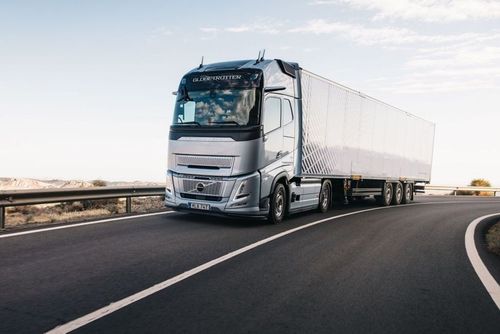Volvo expands its range of biodiesel-powered trucks

Volvo Trucks is expanding its model offers adapted for biodiesel. / SOURCE: Volvo Trucks
May 17, 2024
BY Volvo Trucks
A full range of new Volvo truck models can now be powered by 100% biodiesel, offering another renewable fuel choice for customers looking to reduce CO2 emissions from transport here and now.
Volvo Trucks is expanding its model offers adapted for biodiesel B100. This is yet another move in line with the company’s strategy to reduce the climate impact of its trucks. Volvo Trucks has one of the industry’s broadest ranges of renewable fuel options, including biodiesel, HVO (Hydrotreated Vegetable Oils) and biogas. B100 is now available for a wide selection of engines in the Volvo FL, FE, FM, FMX, FH and FH16 models.
“Our customers are asking for solutions to reduce their carbon emissions and renewable fuels is an attractive option – it’s simply an efficient way to reduce CO2 from transport here and now”, says Jan Hjelmgren, Head of Product Management and Quality, Volvo Trucks and continues:
“As a global truck maker, we need to cater for a wide variety of transport needs and market conditions which is why we do not only invest in new technologies, but also in solutions that decarbonize transport in the short and long term”.
Advertisement
Advertisement
Up to 70% lower CO2 emissions
The “well to wheel” CO2 reduction from using biodiesel is between 30% and 70% compared to traditional diesel fuel, depending on the type of raw material used to produce the fuel.
Volvo’s current range of medium- and heavy-duty trucks are today offered with powertrains that run on diesel, biodiesel, HVO, CNG (Compressed Natural Gas), LNG (Liquified Natural Gas), Bio-CNG, Bio-LNG and electricity.
Advertisement
Advertisement
The combustion engine, powered by renewable fuels, is one of three pillars in Volvo Trucks’ decarbonization strategy, where the other two are battery-electric and fuel cell electric. This strategy is supporting the company’s aim that all sold Volvo trucks should have net-zero emissions by 2040.
Biodiesel – facts
- The available Volvo truck models certified for biodiesel B100 are the Volvo FL, FE, FM, FMX, FH and FH16 models with certain variants of the 5-, 8-, 13- and 17-litre diesel engines - the availability of variants differs between markets – see link to the truck builder tool below*.
- A biodiesel certified model also means that the Euro 6 requirements are fulfilled.
- Biodiesel is a non-fossil fuel sourced from vegetable oils (eg rapeseed oil) and is relatively easy to produce.
- Biodiesel is also known as Fatty Acid Methyl Ester (FAME) according to standard EN14214.
- All of Volvo Trucks’ diesel engines are also certified to run on HVO100 fuel. HVO (Hydrotreated Vegetable Oils) is essentially a biofuel that can be made from a range of materials such as vegetable oils but also waste products.
*Details can be explored in Volvo Trucks’ online truck builder tool.
Related Stories
CoBank’s latest quarterly research report, released July 10, highlights current uncertainty around the implementation of three biofuel policies, RFS RVOs, small refinery exemptions (SREs) and the 45Z clean fuels production tax credit.
The U.S. Energy Information Administration maintained its forecast for 2025 and 2026 biodiesel, renewable diesel and sustainable aviation fuel (SAF) production in its latest Short-Term Energy Outlook, released July 8.
XCF Global Inc. on July 10 shared its strategic plan to invest close to $1 billion in developing a network of SAF production facilities, expanding its U.S. footprint, and advancing its international growth strategy.
U.S. fuel ethanol capacity fell slightly in April, while biodiesel and renewable diesel capacity held steady, according to data released by the U.S. EIA on June 30. Feedstock consumption was down when compared to the previous month.
XCF Global Inc. on July 8 provided a production update on its flagship New Rise Reno facility, underscoring that the plant has successfully produced SAF, renewable diesel, and renewable naphtha during its initial ramp-up.
Upcoming Events










